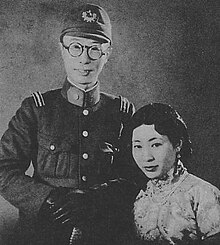Pujie

Aisin Gioro Pujie (born April 16, 1907 in Beijing ; † February 28, 1994 there ) was the second son of Prince Chun II (Zaifeng) and younger brother of the last Chinese emperor Puyi .
Surname
In the German-language literature there are different spellings of the name, for example "Pu Jie", "Pu Chie (h)" and "Pu Dschiä". Pujie's full name was Aisin-Gioro Pǔjié ( Chinese 愛新覺羅 溥傑 / 爱新觉罗 溥杰 , Pinyin Àixīnjuéluó Pǔjié ). The Japanese called him “Aishinkakura Fuketsu” ( Japanese 愛 新 覚 羅 溥傑 ), in another romanization “Huketsu”.
Life
Pujie came from the Manchurian dynasty of the Aisin Gioro , who ruled China as the Qing Dynasty from 1644 . His brother Puyi, nine months older, was the last emperor of China from 1908. From March 1919, Pujie was taught together with him in the Forbidden City in Beijing by the British tutor Reginald Fleming Johnston . In 1921 his mother, Youlan, who was kept away from the children, committed suicide. After his brother's second abdication in 1917, he lived with the imperial family in the Japanese Tianjin Concession for seven years . Pujie married the Chinese noblewoman Tang Shixia in 1924.
1932 his brother Puyi was during the Sino-Japanese Manchurian crisis President of Manchukuo , from 1934 Kaiser this under Japanese control standing puppet state . Pujie became the plaything and leverage of the Japanese and was deliberately "Japaneseized". From 1929 he attended a preparatory school for Japanese nobles, then the Japanese Army Academy . In 1935 he returned to the Manchuk capital of Xinjing (today: Changchun ) and became an officer in the Imperial Palace Guard . His first marriage was divorced in 1936.
On April 3, 1937, at the request of the Japanese in Tokyo , he married Saga Hiro ( Japanese. 嵯峨 浩 ), a relative of the Japanese imperial family . Since Puyi's marriages had remained childless, Pujie was appointed heir to the throne a few weeks later at the insistence of the Japanese by the "State Council of Manchukuo", which contradicted the Chinese tradition, according to which successors to an emperor were generally chosen from the next generation. With the expected half-Japanese children pujies, the Japanese wanted to exert lasting influence on the Manchuk and Chinese imperial dynasties. In 1950, Puyi corrected this decision by appointing his younger cousin Prince Yuyan as heir to the throne after his abdication and imprisonment.
On August 18, 1945, Pujie, along with his brother and other Manchuk officials, was taken prisoner by the Soviets . In 1950, they were extradited to China, where Pujie was detained in re-education camps and brainwashed for 11 years . The Red Chinese proceeded according to Mao's instructions: “When treating ideological and political illnesses, one must not behave roughly, but only proceed according to the sentence: 'Fight the disease to save the patient'”. In 1960 he was pardoned and released from custody by Prime Minister Zhou Enlai .
In 1961 his wife Saga Hiro, who had spent the post-war period in Tokyo with their two daughters, returned to China with their daughter Yunsheng ( 愛新覺羅 · 嫮 生 , Japanese 愛 新 覚 羅 嫮 生 , Aishinkakura Kosei ) (* 1941) . The older daughter Aisin Gioro Huisheng ( 愛新覺羅 · 慧 生 / 爱新觉罗 · 慧 生 , Japanese 愛 新 覚 羅 慧 生 , Aishinkakura Eisei ) (* 1939) had - depending on the source - committed suicide or was murdered in 1957.
In 1962, Pujie was appointed a member of the "Research Commission for Literary and Historical Material" of the Political Consultative Conference of the Chinese People . In the following years he tried to improve the bad relationship between Japan and China through his contacts. In 1986 he was a consultant for the film adaptation of his brother's life story (“ The Last Emperor ”). Most recently he devoted himself to calligraphy . Saga Hiro died in 1987. Pujie died of cancer in 1994 at the age of 86. His daughter lives in Japan again.
literature
- Ivan L. Brackin: Manchu. The Epic Story of Japan's Military Intrigues in China and the Woman Forced into an Imperial Marriage. Llumina Press, Tamarac FL 2005, ISBN 1-59526-114-1 (novel about Hiro Saga and Pu Jie).
- Reginald F. Johnston : Twilight in the Forbidden City. Victor Gollancz, London 1934 (2nd edition, revised & updated) Simon Wallenberg Press, sl 2007, ISBN 978-1-84356-020-3 .
- Henry McAleavy: A Dream of Tartary. The Origins and Misfortunes of Henry P'u Yi. Allen & Unwin, London 1963.
- Pu Yi : I was Emperor of China. From the Son of Heaven to the New Man. The autobiography of the last Chinese emperor. 4th, expanded and supplemented edition. Deutscher Taschenbuch-Verlag, Munich 1987, ISBN 3-423-10710-3 .
Web links
- Globe: end of the yellow dynasty . Focus Online , March 21, 1994
- Johnny Erling: False grandchildren and false nephews . Die Welt , February 7, 2006, on a Qing Dynasty family reunion
Individual evidence
-
↑ Pu Yi: I was Emperor of China. 1987, p. 268.
Epically broadly described in: Ivan L. Brackin: Manchu. 2005.
Hiro kept a diary of her time with Pujie. - ↑ Mao Tse-Tung, speech of February 1, 1942, quoted from: Mao Tse-Tung: Selected Works , Volume 3. Verlag für Fremdsprachige Literatur, Peking 1969, p. 53.
- ↑ See: Zhou Enlai: Remarks at a Reception for Hiro Saga, Pu Jie, Pu Yi and Others. (1961). In: Zhou Enlai: Selected works , Volume 1. Foreign Languages Press, Beijing 1981.
- ↑ In addition: Pu Yi: I was emperor of China. 1987, p. 382.
| personal data | |
|---|---|
| SURNAME | Pujie |
| BRIEF DESCRIPTION | second son of Prince Chun II and younger brother of the last Chinese emperor Puyi |
| DATE OF BIRTH | April 16, 1907 |
| PLACE OF BIRTH | Beijing |
| DATE OF DEATH | February 28, 1994 |
| Place of death | Beijing |